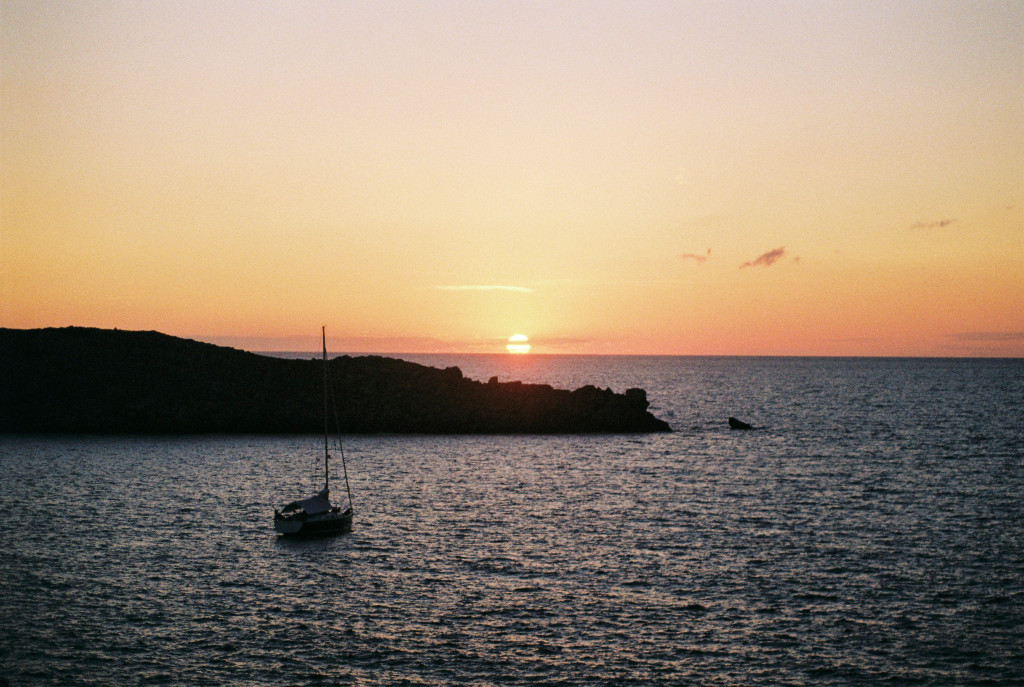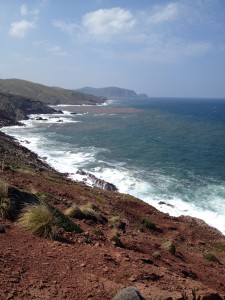Reproduced from the October 2015 edition of Roqueta, Menorca’s English-language magazine.
 October is a time of transition in Menorca. Businesses start to close. The number of tourists drops, apart from a last-minute flutter of half-term visitors from the UK. The “swallows” return, often to close their properties for the winter. As the autumn progresses, those of us who remain on the island begin to feel a twinge of guilty pleasure as “our” island returns to its quieter phase. That I can write this after only a couple of years says much about how easily Menorca lays claim to the hearts and minds of its residents and how quickly it take possession of us! How it does so is something quite mystical, engaging senses of sound, sight, smell, coupled with imagination and memory.
October is a time of transition in Menorca. Businesses start to close. The number of tourists drops, apart from a last-minute flutter of half-term visitors from the UK. The “swallows” return, often to close their properties for the winter. As the autumn progresses, those of us who remain on the island begin to feel a twinge of guilty pleasure as “our” island returns to its quieter phase. That I can write this after only a couple of years says much about how easily Menorca lays claim to the hearts and minds of its residents and how quickly it take possession of us! How it does so is something quite mystical, engaging senses of sound, sight, smell, coupled with imagination and memory.
Dr Endel Tulving is a cognitive psychologist who has done a great deal of research into human memory. He is still working, well into his 80s. He was in the forefront of those who recognized that our memory is not a unified system within our brains, but that we have different types of memory. He also has related memory to imagination. We can imagine because we can remember: imagination is an extension and expansion of memory. Every time we remember something, we re-imagine it.
I once heard Dr Tulving answering the imponderable question about a tree falling in the forest. (If a tree falls in the forest, and there is no one there to hear it, does it make a sound?) In essence, what he said was this: if there is no one to hear it, the tree makes no sound, because we generally define sound as something auditory, that is heard. Without hearing, there can be no sound. When the tree falls there is compression and rarefaction of air. For there to be sound, there must be a brain, attached to a sensory system that handles these kinds of energy changes and makes something of them. From the tree falling in the forest, therefore, it is a short step to Beethoven’s Ninth Symphony, because it, too, consists of compression and rarefaction of air, and reception of that energy, admittedly in a much more complex and organized fashion. In essence, what Dr Tulving says is that it is all in our minds: the sound of a tree falling, Beethoven’s Ninth Symphony, the cry of a baby, the waves falling onto a beach, and, of course, the language with which we communicate. We create “sound pictures” from the acoustic energy reaching our ears.
When considering Beethoven it is pertinent to remember that he could hear sound when his auditory system had failed (in other words, when he was deaf). Beethoven was able to make use of a combination of memory and imagination to create in his mind sounds that would result from musical notes on the page. I was going to write “recreate” in that sentence, but the true genius of Beethoven – an ultimate example of the intrinsic genius of the human brain – is that he was able to create something new from his combination of memory and imagination.
All of this brings to mind the remarkable, intricate relationship that exists between humankind and the created order in which we live. It is very easy to take for granted our visual and aural environment. For us to perceive and enjoy our surroundings, visually, there is a conjunction of processes, from the colour properties of different materials, that reflect selective wavelengths of light, in turn depending upon the chemical structure of molecules within them, to the transmission of light, to the ways in which our eyes receive light and our brains process it, resulting in impressions of colour. And we should not forget that none of this would be possible without us being bathed in the light of the sun, which manages to convey warmth and energy over a distance of 93 million miles of space.
For us to hear, our brains have to be able to organize patterns of compressed and rarefied air into sounds that have form and meaning. In the case of both sight and hearing, we have been gifted (especially in Menorca) with an environment that stimulates our brains, and brains that respond to stimulation. This is a small part of the gift of life that we have been given. To trudge through life without appreciating the true nature of the gift and the gift of nature – or at least, to try to appreciate the gift, since we probably all have blind spots or elements that we take for granted – would be a sad form of ingratitude to a creator who has bestowed upon us a rich endowment of beauty to appreciate, and ways to enhance the beauty of our surroundings, as we can do with art and music, for example. It is a wonder that in the vast expanse of interstellar space and in the microscopic workings of the brain, and in the physical universe between, we have been blessed with the ability to see, to hear, to feel, to touch, to smell and to taste.
Most of all, we have been blessed with the opportunity for a personal experience of the universe. In addition to being thankful for a creation of beauty, we can be thankful for the individual experience of the created environment in which we live. This is all part of the personal nature of our relationship with creation and the creator. And so there is an extension of this into the way that we experience the divine and our spirituality.
Individual experiences of the divine in nature are important, but by coming together in a community of faith, we have opportunities to share our individual visions and compile a collective vision. By incorporating our own stories into the communal story, and by allowing others to become part of ours, we complete the pictures that we draw in our minds. If we close our spiritual eyes and shut off the personal experience of the creator, we deprive not only ourselves, but we deplete the collective vista of humanity’s story of the divine presence in created life.
 Let us be thankful for the beauty of the created order in which we live, and for the sights and sounds that are generated within us as our sensory systems respond to the stimuli that are presented to them. Let us be thankful for sunshine and seas and skies of almost indescribable colours. Let us be thankful for music and sound. Let us be thankful for the personal gift of the particular experience of the world around us, and its divine content, that is unique for each one of us. Let us be thankful for the opportunity to share our specific experiences and add to the compilation of spiritual human experience. And let us be thankful for this beautiful island as it enters its cyclical season of transition.
Let us be thankful for the beauty of the created order in which we live, and for the sights and sounds that are generated within us as our sensory systems respond to the stimuli that are presented to them. Let us be thankful for sunshine and seas and skies of almost indescribable colours. Let us be thankful for music and sound. Let us be thankful for the personal gift of the particular experience of the world around us, and its divine content, that is unique for each one of us. Let us be thankful for the opportunity to share our specific experiences and add to the compilation of spiritual human experience. And let us be thankful for this beautiful island as it enters its cyclical season of transition.
Comments are closed.